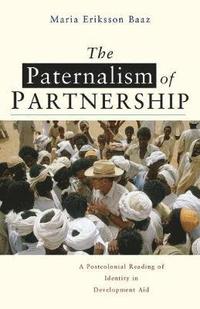
- Format
- Häftad (Paperback / softback)
- Språk
- Engelska
- Antal sidor
- 224
- Utgivningsdatum
- 2005-03-01
- Förlag
- Zed Books Ltd
- Illustratör/Fotograf
- black & white illustrations
- Illustrationer
- black & white illustrations
- Dimensioner
- 216 x 137 x 7 mm
- Vikt
- Antal komponenter
- 1
- ISBN
- 9781842774151
- 280 g
The Paternalism of Partnership
A Postcolonial Reading of Identity in Development Aid
- Skickas från oss inom 7-10 vardagar.
- Fri frakt över 249 kr för privatkunder i Sverige.
Passar bra ihop
De som köpt den här boken har ofta också köpt Slow Productivity av Cal Newport (häftad).
Köp båda 2 för 784 krKundrecensioner
Fler böcker av Maria Eriksson Baaz
-
Sexual Violence as a Weapon of War?
Maria Eriksson Baaz, Professor Maria Stern
All too often in conflict situations, rape is referred to as a 'weapon of war', a term presented as self-explanatory through its implied storyline of gender and warring. In this provocative but much-needed book, Eriksson Baaz and Stern challenge t...
-
Africa's Return Migrants
Lisa Akesson, Maria Eriksson Baaz
Many African migrants residing abroad nurture a hope to one day return, at least temporarily, to their home country. In the wake of economic crises in the developed world, alongside rapid economic growth in parts of Africa, the impetus to 'return'...
Recensioner i media
'On the basis of an excellent analysis of the Nordic intervention in East Africa, Maria Eriksson Baaz takes us into the compexity of a difficult dialogue between aid to development and politics of identities. This is a remarkable study that will serve as a firm and well thought out introduction to postcolonial studies in general.' V. Y. Mudimbe 'The post-colonial discourse has been somewhat lacking in empirixal substance. This is, therefore, a much welcomes and fascinating book on the construction of identity in the development industry.' Bjorn Hettne 'Development theorists are beginning to acknowledge that aid workers reproduce and thrive on postcolonial representations of identity. The African "other" is sometimes seen through a romantic lens, more often a derogatory one: passive, corrupt and dangerous. Eriksson contributes to this emerging body of work by exposing and contextualising such racist assumptions.' Emma Crewe, University of Warwick 'The Paternalism of Partnership is an important contribution to the development literature. The development industry is no stranger to criticism. Recent critiques have drawn on post-colonial approaches for their attack on the Euro-centric nature of much development policy and praxis, but few have explored detailed case studies. Eriksson moves the analysis to another level, examining the discourses, identities and politics of Nordic donor agents in Tanzania. Her grounded, in-depth analysis demonstrates the exciting potential of post-colonial approaches, both for illuminating the complexities of grassroots aid delivery and for understanding the impact of global development discourses policy and praxis. This book is a landmark study that will attract attention from students and scholars.' Jane Parpart, Lester B. Pearson chair in international development studies at Dalhousie University, Canada
Övrig information
Maria Eriksson Baaz is a researcher at the Department of Peace and Development Research (Padrigu), Goteborg University, where she obtained her PhD. She has recently been a visiting professor at Dublin City University and guest researcher at the Nordic Africa Institute. Besides lecturing at Padrigu and DCU she has lectured extensively at development organizations. Baaz has published several articles in her field.
Innehållsförteckning
Preface 1. Identity and development aid 2. 'The white man's burden' and other stories 3. Situating identity in the development aid context 4. The omniscient self and the backward, passive and unreliable partner 5. The equal partner and politics of desire 6. Concluding remarks
Du kanske gillar
-
Transformed
Marty Cagan
Inbunden


